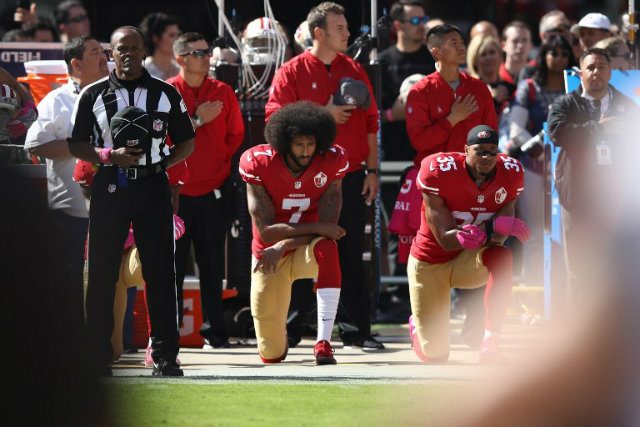SUMMARY
This is AI generated summarization, which may have errors. For context, always refer to the full article.

LOS ANGELES, USA – From Colin Kaepernick‘s boycott of the US national anthem to LeBron James wearing a t-shirt to protest the death of a black man at the hands of police, US athletes are increasingly ready to make their voices heard after years of relative silence.
Three years ago, Kaepernick was starring at quarterback for the San Francisco 49ers in the Super Bowl. But it was not until last month that the 28-year-old found himself afforded the accolade of landing on the cover of Time magazine.
Kaepernick had triggered a passionate nationwide debate after refusing to stand for “The Star Spangled Banner” during the 49ers’ pre-season games, in order to draw attention to social injustice and the treatment of minorities by law enforcement agencies.
The quarterback’s decision to take to one knee during the anthem was met with howls of outrage in many quarters, with accusations that Kaepernick was guilty of treason and disrespecting US military personnel.
Yet Kaepernick‘s protest won a solid core of support from many fellow current and former athletes, not least from Tommie Smith, the sprinter who was sent home in disgrace from the 1968 Olympic Games after his podium “black power” salute along with compatriot John Carlos.
“He is being vilified in how he brings the truth out. I support him because he is bringing the truth out, regardless of how done,” Smith told USA Today.
“We must move and deal with these issues, we just can’t sit back (…) there are a lot of battles to fight because it’s a big long war.”
Kaepernick‘s anthem protest has continued throughout the season. Other NFL players have chosen to show their support for the 49ers star, notably the Los Angeles Rams’ defensive end Robert Quinn, who raised a clenched fist salute during the anthem before his team’s game against the New York Giants in London on Sunday.
Visible activism
The scattered protests are part of a trend towards activism that has become increasingly visible in recent years.
In 2012, James led his then Miami Heat teammates in a group pose all with tracksuit hoodies drawn up over their heads.
The image was a protest against the killing of black teenager Trayvon Martin earlier that year by a neighborhood watch volunteer. The unarmed Martin, 17, was wearing a hoodie when he was shot.
Two years later, James was among NBA players who wore t-shirts bearing the message “I can’t breathe” – a reference to the final words of New York man Eric Garner who died after being placed in a chokehold during a confrontation with police.
And now, ahead of the November 8 presidential election, James has voiced his clear support for Democrat Hillary Clinton.
“We are seeing a rebirth of the activist athletes. In the 60s and 70s, we saw some very prominent athletes like Muhammad Ali, Billie Jean King and John Carlos speaking up about the social issues of the day, about racial injustice,” said Orin Starn, an anthropologist at Duke University.
“And then for the 1980s, 1990s and 2000s, we had the rise of the corporate athlete, who was more interested in endorsements, winning, being the best he could be at the sport, his family, making some charitable donations to an uncontroversial cause,” Starn added.
Michael Jordan, a 6-time NBA champion with the Chicago Bulls who helped power the global explosion in popularity of basketball during the 1990s, has long-been regarded as the archetypal corporate athlete.
He infamously once declared “Republicans buy sneakers too” to justify his reluctance to campaign for a Democrat in North Carolina. Los Angeles Lakers legend Kareem Abdul-Jabbar decried Jordan’s position as “commerce over conscience.”
“Michael Jordan was focused on being the best basketball player ever and on his Nike endorsements,” Starn told AFP.
“He sets the model, the template for a whole generation of athletes, for the 1990s and in the 2000s. Tiger Woods followed exactly the Michael Jordan model in avoiding any kind of touchy social issues, focusing on his golf game, and earning a lot of money on his corporate endorsements.”
‘LeBron is no Ali’
By demonstrating his willingness to engage in social issues, James has broken from Jordan’s carefully crafted public image.
In July, James took to the stage at the ESPY Awards along with Carmelo Anthony, Chris Paul and Dwyane Wade to protest police brutality, urging athletes to take an active role in tackling injustice.
Despite the public pronouncements, Starn however sees limits to the recent rise in athlete activism, noting that James was not the kind of “political animal as Ali was.”
“For LeBron, sports come first; Ali gave up a heavyweight championship. I am not sure LeBron is ready to leave the NBA as a protest on the killings of young black people,” Starn said.
“It’s terrific that LeBron has been outspoken, (but) activism is not yet the core of who he is.
“The new sport activism marks a dramatic change from 10-20 years ago but it is also really limited – it’s fired by the Black Lives Matter movement … it really remains to be seen whether this new activism will go beyond that particular issue.
“Is Colin Kaepernick going to inspire other athletes to speak up about Syria, poverty in America, the danger of a Trump presidency? That remains an open question.” – Jérôme Rasetti, Agence France-Presse/Rappler.com
Add a comment
How does this make you feel?
There are no comments yet. Add your comment to start the conversation.